
2020 has proven to be a difficult year in more ways than one.
The coronavirus pandemic in particular has shone a light on the many economic disparities in America and has left millions of Americans struggling to make ends meet. Many have found themselves tapping into their emergency savings — or worse, wishing they had some.
On top of this, 34 percent of millennial credit card holders said that they had fallen further into debt as a direct result of the pandemic, according to a recent CreditCards.com survey, a sister site of Bankrate.
Juggling debt and worrying about building your savings at the same time can really weigh on a person. While there’s no right answer for everyone, here are scenarios for when each choice – paying down debt or saving – makes more sense.
When to make saving priority
There are a number of good reasons to save first and pay down debt later.
Some of the top reasons include:
- Debt with a very low interest rate
- Access to an employer 401(k) match program
- No emergency savings
If you have a credit card or other debt with a very low interest rate, it may make sense to save first, says Melissa Joy, a certified financial planner and founder of Pearl Planning, a financial planning and wealth management practice in Dexter, Mich.
Another situation where it makes sense to save before paying off debt is if you have access to a retirement savings plan through your job, especially if there’s an employer match available. Try to contribute at least enough to get the maximum employer match. If you aren’t doing this, you are effectively turning away free money.
And putting off saving for retirement until you are debt-free could cost you your most valuable asset: time. With compound interest, even small contributions to your retirement plan can grow significantly.
However, the top reason to make saving a top priority over paying down debt is to build your emergency fund. Without some money saved up, you could simply wind up adding to your credit card debt in order to pay for an unexpected car repair or a trip to the emergency room.












